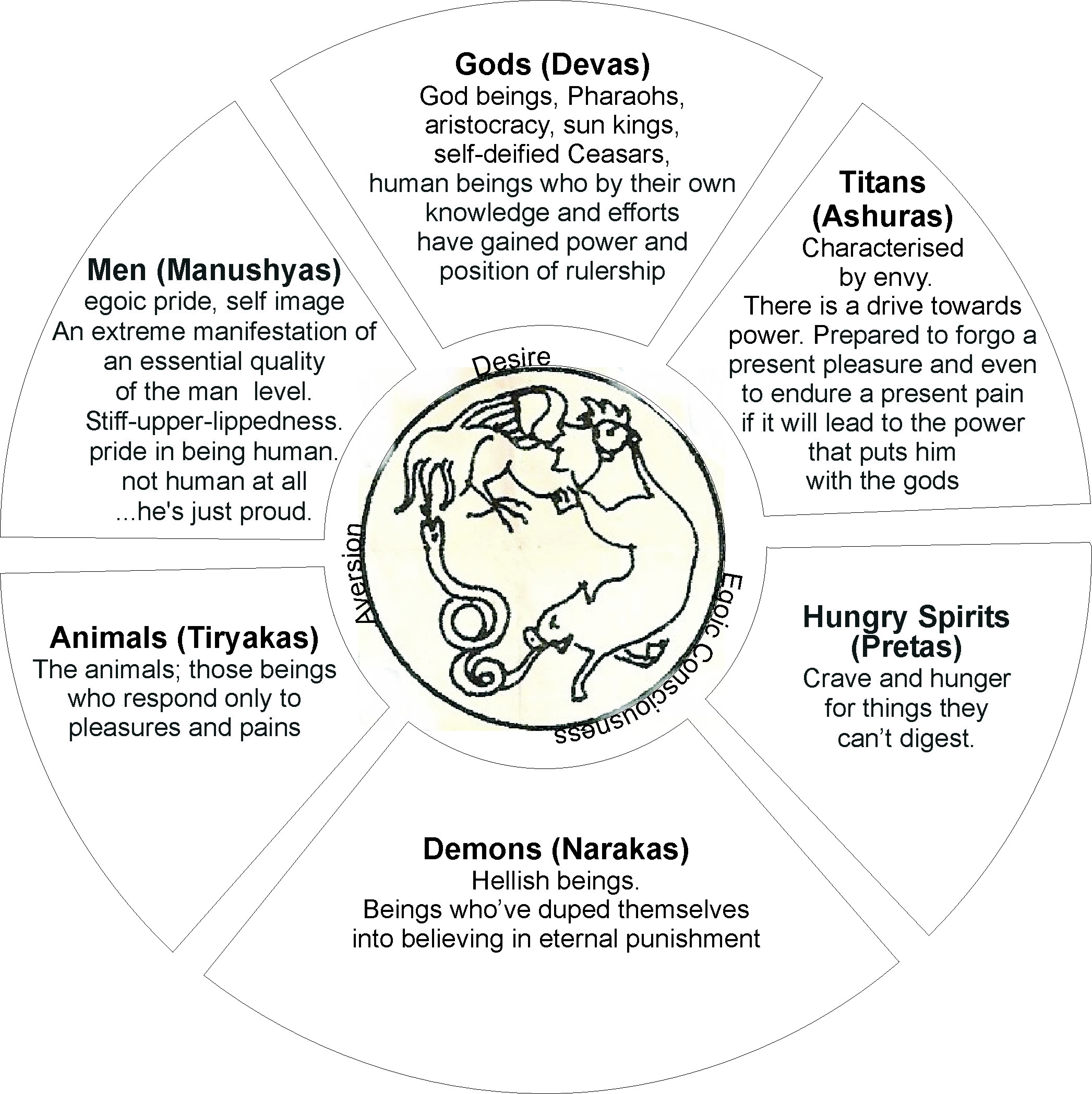
The talk is recorded in two parts.
Transcribed by John Bailey, November 2007.
Colour pictures of the wheel were taken from:
http://www.cleo.net.uk/resources/displayframe.php?src=205
…the placement of the six types on this wheel are slightly different to Eugene’s.
Sanskrit words were verified at http://spokensanskrit.de/

There is only one being, and all the functions of this being produce, apparently, a plurality of beings. But these beings are fundamentally one being, who is the host ... and the plurality are the guests within the house.
The Holy G-host is the same infinite spirit, internal to which its own modalities, its own different modes of behaving and functioning, produced an apparent plurality. Now the same thing appears in this Buddhist Wheel called the Wheel of Life, and the analysis of it can be done in a variety of ways. The usual way is to describe it as a wheel illustrating six totally different realms within the totality of manifest universal formal function.
But there is another key to it.
Y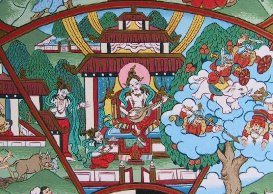 ou’re
all probably thoroughly familiar with the Greeks’ definition of
the gods and their behaviour ... that in Greek philosophy the gods
were so pre-occupied in their heaven with their own delights, that
they ignored the rest of reality. Now, it’s precisely the same
definition in this Buddhist Wheel is given of the gods, the Devas of
the Buddhist and Hindu system.
ou’re
all probably thoroughly familiar with the Greeks’ definition of
the gods and their behaviour ... that in Greek philosophy the gods
were so pre-occupied in their heaven with their own delights, that
they ignored the rest of reality. Now, it’s precisely the same
definition in this Buddhist Wheel is given of the gods, the Devas of
the Buddhist and Hindu system.
In the top segment of the circle here we have the gods. Now it is customary in literature to speak of these beings under the name gods, divine beings and so on, and to allow a reader to believe that there are beings that are gods, and are divine, that are utterly different from human beings. But if you remember in the Sankya philosophy which we did, it was stated very clearly that there are no gods in the universe other than human beings who have attained power and knowledge. So that when gods are referred to in the Buddhist system, or in the Hindu system, what is meant by the term is, those human beings who have attained the level of knowledge and power such that they can get what they want.
Now if we define the gods in this way, we can say where the gods live is heaven, which really means the equilibration of power. And yet they’re inside this wheel.
Now in occidental religions, Christianity specifically, there’s a general belief that heaven is forever — without bothering to define forever — or heaven is eternal — without defining eternal. But in the Buddhist system, and in the Hindu system, they say quite simply that this is not so. They say that the gods are beings who have attained, by their efforts, knowledge and power. And they have attained this by their efforts in time. And whatever is gained in time can only apply to time, and for a time. And therefore the beings who are called gods, those attained human beings, although they have got into this state of power and knowledge by their own efforts, if they forget this basic principle — that what is gained in time and from time cannot go beyond time — then they must know that no matter how many Tories there have been in order to gain this knowledge and power, there is a natural term in time for their heaven, which they have, out of their meritorious deeds, constructed.
Therefore in this Buddhist system it is said that the gods have a peculiar fault; that is, they are so busy enjoying the merits of their deeds of knowledge and power, that they are ignoring the finity of the heaven they have created. They are ignoring the fact that it is a temporally derived and temporally enduring structure, which must eventually come to an end.
So the gods have this peculiar quality — like we find in the Greek mythology — of ignoring the rest of the universal manifestation. They don’t want to know that there are other beings. There are beings called titans, humans, animals, hungry spirits, beings in hell — they don’t want to know about it. And because they don’t want to know about it, they are called beings unenlightened. They have pushed away the time of reckoning, the time when their good deeds and merits will have been paid for in time and therefore must cease.
Now if we remember that Aesop and many other fablists — when they wanted to criticise the human race and the human government — to keep their heads on their shoulders, they used to disguise their criticisms in fables, stories about animals: the story about a fox that lost its tail and then recommended that foxes looked more handsome without tails, and suggested that all foxes should have them cut off. This is really a statement — a very cunning man having lost a certain power, persuaded a lot of other people, or tried to, to likewise sacrifice their power, to even things up. You remember Christ said about Herod, that fox1. Aesop is saying the same thing. Certain men of great cunning attain positions of power, and in the process they find that they have lost something, euphemistically called the tail. And they then try to dissuade everybody else from tail-wearing.
By this method of disguising criticisms in fables, the critics, the prophets and others, managed to live a little longer than they would have done. And so in the same way, the great religions have a method of disguising a typology; a system in which human beings are characterised according to certain stresses in six ways, and these ways are given different names, and the statement is made that they are really different beings. And then the person who hears this is allowed to misunderstand it, by thinking that beings are in some mysterious way separate from other beings — as that gods are separate from humans; gods are separate from titans; humans are separate from animals; animals are separate from beings in hell; and those beings are separate from hungry, craving spirits that wander about.
Now by splitting it in this way, the great religious leaders were enabled to do double talk. They could have a perfectly coherent typology which enabled them to deal with other human beings at certain levels, certain functional levels, without betraying their governing concept. And in this six-segmented wheel, this typology is contained.
So when we talk about heaven and the realm of the gods — and we say, the gods are enjoying themselves in their heaven, and they are ignoring the rest of universal manifestation; enjoying the fruits of their own efforts of gaining knowledge and power — we are really talking about certain human beings who, by their own knowledge and efforts, have gained power and authority and positions of rulership.
And if you want to look for an illustration of these people historically, we can, today, in a socialist Britain, say that we can talk about overthrown aristocracies. We can say that it was thoroughly understood by the people who devised this terminology, that the rulers of the world were quite pleased to refer to themselves as gods. We know this happened in Europe. We know that emperors allowed themselves to wear a golden crown with rays coming out, to show that they were sons of the sun, and allowed themselves to be deified; allowed the people to believe that they were really gods. If you read Shakespeare’s Julius Caesar, you will find some degree of surprise in certain people that a god can bleed, and a god can have some kind of attack that unmans him, and a god can die with a sufficient number of knives in him. But if we remember that the people themselves were unaware of the true meaning of the terminology, and that the persons who devised the terminology had another meaning for their terms, then we can understand how easy it was to dupe people, and to rule them, by saying things with two meanings — one meaning to the people who devised the terms, and another meaning for the people who merely passively received these terms.
So the gods then, here in this system, signify only human beings who have attained knowledge and power. And they’ve had it so long that they cannot, and do not, want to imagine that that time will come when all this merit that they have accrued, all this knowledge and power, will be useless.
We did find, during the time we abandoned India, certain factions in this country that were rather godlike who thought we ought to retain India ... we ought to keep hold of the British Empire. There were some more forward-looking people, who knew that we couldn’t hang on forever, and therefore said, give it away quickly before it’s taken away, and we will retain our prestige. There was a great fight about this in this country at the time. Those of you over twenty-one will probably remember it. [This talk was probably given sometime in the nineteen-sixties.]
During the French revolution we saw that the French gods — you remember that one of the French kings was quite pleased to call himself the sun-king, and to try to re-animate this concept that kings are gods — these aristocratic rulers were actually overthrown. Like the gods in this Buddhist wheel of life, they did not believe that they could be overthrown. They didn’t understand that certain of their own members, a little lower down the hierarchy of gods, had sensed that they were going to be invaded by other forces.
In the same illustration we have Russia, when the revolution in Russia startled many of the aristocracy, the gods; and their term of enjoyment of their knowledge and power came to an end. So we can say the characteristic here of the gods is that they ignore the rest of the universe, and they have duped themselves into believing that their heaven state of enjoyment will never cease.
N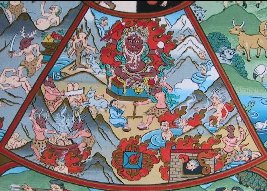 ow
Buddhist psychology is essentially dialectical and therefore
immediately opposite to the heavens there are the hells, a variety of
hells, but they’re all under the general heading hells.
And the characteristic of these people in the hells is that, like the
gods, they dupe themselves, but in this case instead of duping
themselves into believing that joys and pleasures from merit are
eternal, the beings in the hells actually dupe themselves into
believing that sins committed in time merit eternal punishment
[12:51].
ow
Buddhist psychology is essentially dialectical and therefore
immediately opposite to the heavens there are the hells, a variety of
hells, but they’re all under the general heading hells.
And the characteristic of these people in the hells is that, like the
gods, they dupe themselves, but in this case instead of duping
themselves into believing that joys and pleasures from merit are
eternal, the beings in the hells actually dupe themselves into
believing that sins committed in time merit eternal punishment
[12:51].
So the beings in the hell that are quite illogical, they believe you can do a sin in five minutes and pay for it for eternity. It is not logical. I doubt if anybody thinking very carefully would say that a thing committed in five minutes should be paid for in five years — in the case of long terms, like five hundred thousand million zeroes after a figure, could possibly be the correct amount of time to spend paying for a sin of five minutes; is wrong. There must be an equation. If it takes you five minutes to commit a sin, you should be able to recover in five minutes, in all logic. But the beings in the hells have duped themselves into thinking that they can’t do this.
Now we find in Christianity that Christ, after duly being crucified, goes down into hell, and he goes down with the express intention of saying to the beings down there, you don’t need to stay down here.
And the peculiar thing is, in the Buddhist system there is a very refined spirit and he goes in the hells and he has two titles, one of which is the Lord of Death, and other one of which signifies that he is the saviour. All he does is hold up a mirror to the beings in hell, with a funny word written on the mirror, which you might write HRIH, which you might pronounce hree [the pronunciation can be found on the The Buddhist Wheel.MP3 part 1 at point 14:30] which means you did it yourself.
Your power differentiated you, this created your concept of individual responsibility, your power must release you.
But until they are shown this mirror, that there is no criticism that is valid other than self-criticism, the beings in the hells cannot come out. They are duped into thinking, quite illogically, that they can pay an eternal price for a temporal error.
So we observe the cunning of this Buddhist definition, the polarity in it. There are two kinds of way of imagining that something is going to last eternally. One is to imagine your joys gained in time from your merits of good deeds are going to be eternal; the other is to imagine that your sins done in time are worthy of eternal punishment.
T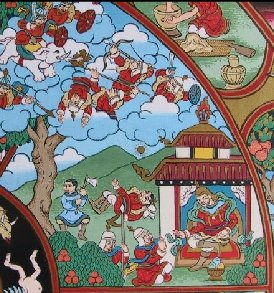 his
kind of opposition is not brought out in the literature on the
subject because it is very, very convenient for controlling people to
give them this sense that it is possible to commit a five-minute sin,
and spend five hundred thousand million years paying for it ...
because it tends to cause less performance of sin. And it weakens the
person who believes in it, so that he can do as he is told more
easily than he would otherwise do.
his
kind of opposition is not brought out in the literature on the
subject because it is very, very convenient for controlling people to
give them this sense that it is possible to commit a five-minute sin,
and spend five hundred thousand million years paying for it ...
because it tends to cause less performance of sin. And it weakens the
person who believes in it, so that he can do as he is told more
easily than he would otherwise do.
Now next to the gods on this side there are some beings which are called titans. We don’t need to give them their names in various other languages, because they all add up to the same thing. Just as the gods are characterised by ignoring the temporality of their joys, so the titans are characterised by envy of the gods. The titans are all the big men — I won’t mention any names of public figures, they’ll all spring automatically to your mind — all the men who strive to get power, and position, and authority, and knowledge, and reputation, because they know that there are some beings that have these things.
Imagine a man, it might be a gentleman actually in Monte Carlo, gambling away the Chief Rents from certain territories in England. You see them in the Tattler, in the Sphere [periodical magazines], and they say lord so-and-so at the tables, and if you inquire the source of his income, it is actually Chief Rents and suchlike things, from territories that were once green and are now full of chimneys and things.
Now, imagine the gods are there, and some ambitious fellows who are not yet gods, but they are very strong, and their main characteristic is envy of those gods. They want power. They want joy forever, they want large Chief Rents, they want lots of land that people have to pay for in perpetuity. And they don’t want to work even, they just want to collect. So the titans are all those men who are essentially power-pursuing because they know, they see that there are beings in the world with power and with know-how, who have actually, historically, their ancestors, gained these positions of power ... positions for which those men don’t need to work any more. They can have a town house and a country house, and another town house because they don’t like the colour of the first one, and several country houses in different countries, and they don’t have to work any more, because their ancestors worked with double bladed swords, battle-axes, clubs and such-like implements of refined thinking [audience laughter].
Now today it is very difficult to go out with a club, and proceed to club the gods into insensibility, without upsetting the people. Because, funnily enough, the people revere gods, because secretly there is inside everybody a desire to be such a god, and so they’re rather nervous that if ever they did become gods...
A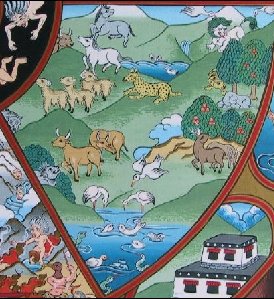 s
a fellow once said to me during the war, American soldier, who said
to me that, he claimed that the USA was superior to Britain because
he could in principle be the president, and I could not in principle
be the king. Well, we all know that there’s no more likelihood
of that particular G.I. becoming a president. He’d have to be
born in another family to get the necessary springboard for the jump.
But he didn’t want to know this. He really liked to think that
he could become the president, and if we remember that this wheel is
simply the six part whole being of the universe, and of an individual
man, then we know there is an impulse in each individual that could
appreciate being a god in this sense. We also know that because he is
not a god in this sense, unless of course he is, then he could have
his titan impulse, his envy of power, his envy of knowledge of
brilliance. So the titans are continuously striving for power ...
they have this peculiar quality that they can make efforts.
s
a fellow once said to me during the war, American soldier, who said
to me that, he claimed that the USA was superior to Britain because
he could in principle be the president, and I could not in principle
be the king. Well, we all know that there’s no more likelihood
of that particular G.I. becoming a president. He’d have to be
born in another family to get the necessary springboard for the jump.
But he didn’t want to know this. He really liked to think that
he could become the president, and if we remember that this wheel is
simply the six part whole being of the universe, and of an individual
man, then we know there is an impulse in each individual that could
appreciate being a god in this sense. We also know that because he is
not a god in this sense, unless of course he is, then he could have
his titan impulse, his envy of power, his envy of knowledge of
brilliance. So the titans are continuously striving for power ...
they have this peculiar quality that they can make efforts.
When we compare them with some other aspects of the wheel, we’ll see what a marvellous virtue this envy and power-seeking is. Because opposite to the titans we have animals, and if we remember that again … those look like animerds — the way I’ve written it [said as an aside] … animals. The opposition between the gods and the beings in hell, was simply that they were both self-duped into believing that their condition was eternal. Now in the case of the titans, they pursue power by their individual efforts ... and the animals do not.
So the animals mean those beings, those impulses inside us which only react to pleasure and pain. They take present pleasures, and avoid present pains ... if they can manage it. So again there’s this peculiar opposition. There’s a driving force in the titans, and in the animals, but it differs in this sense: in the titans it is a drive towards power, and in the animals, a drive towards a satisfaction of pleasures and the avoidance of pains.
And yet there’s a remarkable similarity because the behaviour of a jolly good titan is very, very much like an animal’s, except that the titan doesn’t need a present pleasant stimulus. And he doesn’t need a present painful stimulus to make him move away, because the titan has a certain amount of reflexive power that allows him to anticipate the avoidance of a pain that has not yet arrived. That is, he might crush a person that has not yet harmed him, but might, if he manages to grow any bigger in five years time. And he might refuse a present pleasure, if it interfered with his gaining of power, and his possibility of joining the gods.
Whereas the animals, those beings who respond only to pleasures and pains, have no such capacity that the titans have, of forgoing immediate pleasure, or facing immediate pain. So there again is this polarisation of the titans and the animals.
I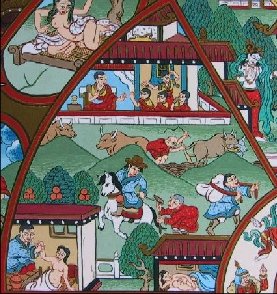 n
every human being there is a titan, an envious impulse that would
seize power, and is prepared to forgo a present pleasure, and even to
endure a present pain, if it will lead to the power that puts him
with the gods. So we might find one of our most prominent
politicians, trying to stay sober during a TV interview [chuckles
in the audience at this reference], in order to give an
impression of rationality, and consideration for the electorate.
Actually he is not the very best quality type in that one, because he
doesn’t manage it.
n
every human being there is a titan, an envious impulse that would
seize power, and is prepared to forgo a present pleasure, and even to
endure a present pain, if it will lead to the power that puts him
with the gods. So we might find one of our most prominent
politicians, trying to stay sober during a TV interview [chuckles
in the audience at this reference], in order to give an
impression of rationality, and consideration for the electorate.
Actually he is not the very best quality type in that one, because he
doesn’t manage it.
Now, the humans, I’m going to write men in here, it’s really wrong to call them humans, I’m going to write men in there and [referring to the drawing], they have a peculiar quality too. Men have the quality called egoic pride. Now this is something that titans don’t suffer from at all. A titan has no pride; he only has the drive towards power so that he can be like the gods. So he has not got an opinion of himself that would make him refuse something on self-opinion. He couldn’t say to himself, I am the kind of person that cannot be bribed — a type that can be bribed. And he couldn’t say, my pride will not let me bribe that inferior being, because he can and does bribe that inferior being to get a step nearer the gods and their heaven.
The peculiar thing about man in his egoic pride, this peculiar pride, consists in one thing – self image; of value; that somehow, mysteriously, simply to be a man is already sufficient merit. In America of course, in the last few years, they’ve done a terrific analysis of what they call the image, and everybody has to have an image, and the image must be continuously polished up and redefined and kept up to date. And it does not matter what or who the person is, as long as the image is alright. Now this is an extreme manifestation of the essential quality of the man level: egoic pride.
This pride in him is very funny, very strange. Because his pride will not let him take a present behaviour like an animal, it can even make him suffer a pain, in public, with a stiff upper lip — for no other purpose than demonstrating stiff-upper-lippedness [more audience laughter]. It can let you walk off the cricket field, bowled for a duck, head held high [spoken with parody]; it can dissolve an empire with a gracious smile, quite easily.
The essential quality of man is that he can do the most strange, unprofitable things, and miss the most profitable things, and still keep his image — that somehow he’s a thoroughly decent type. He’s not an animal. He doesn’t have sensuous lust. He’s not deterred by threats of pain, and he’s not a titan with envious, greedy, power-seeking being, and he’s not a forgetful god who doesn’t know the rest of the word exists, he is a man of pride in being human. Actually he’s not human at all, he’s just proud [more laughter].
Now, obviously to
the men, there are some funny beings, I’ll write in here their
technical name in Sanskrit, they are pretas —
I’ve written that in there because it’s a short word, if
I wrote the English equivalent it would be two words, and it would be
longer, and I haven’t that much space. These beings are
characterised by wanting something they haven’t got the power
to get; and which if they got they couldn’t d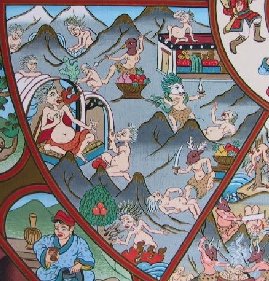 igest
it. They are humorously called hungry spirits. [27:00]
And they are said to be the spirits that the necromancers call up,
and we’ll see a simple logic about this:
igest
it. They are humorously called hungry spirits. [27:00]
And they are said to be the spirits that the necromancers call up,
and we’ll see a simple logic about this:
Just as men can do without things out of their egoic pride: you know, if a man hadn’t had his dinner and he goes to a friend’s house and dinner is just starting, he can say, thank you very much, I have eaten, and sit there. And they’ll say, won’t you have something? [And he’ll say] “no, no, no, Mother told me always to leave half my dinner on the plate so people don’t know I’m hungry”.
[Chuckles in the audience for several of the following sentences.]
Now these preta beings, these hungry spirits — they have no pride whatever, they go about with their mouths slightly open, they look, if they come in your house and it’s the meal table is being cleared up they go… … and look at a bit of cheese on the table. They move towards it. They have no pride, and if you say, would you like a bit of cheese, they say, thank you very much. And the chair is up to the table, bibs on, and then they get indigestion.
Peculiar thing about them is; they are represented in Buddhist pictures in a very funny way. They are very long, thin beings, rather like a banjo, with a very round tummy that’s swollen out; the rest of them is long and thin. Now, there is such a thing inside human beings too, they have these cravings for things they can’t digest. I know a young fellow who has at the present moment a craving to be able to follow the score in public at a concert, given by Barbarolli. It’s a funny thing to watch [Eugene chuckles] but he actually wants it.
Now there are many other things these preta beings want. You can define them all by examining yourself very carefully. If you go home and ask yourself, what do I really want that I can’t digest and can’t conceive myself of digesting? Then you can say all those grouped together, and considered to be in a realm of their own, are preta beings. Now they’re said to be the things that the necromancers work with, and they’re the fellows that manipulate the dead — the spirits of the dead.
That means to say that a very astute man can recognise the hunger in people for things they can’t digest, and then make a little model in PVC of it, and sell it to them. There is actually on the market in America, a very small PVC travelling companion, small enough to be carried in the breast pocket, and self-inflating to human size, so that you won’t feel lonely on a long journey [more laughter]. These are being specially manufactured for pretas consumption.
Now, when we see these six realms — remember a realm means a zone that is ruled by something — and that any individual human being has got these six types of tendency inside himself — they are not just simply six separated realms of the universe —
as if the heavenward gods were someplace far away;
and another place where titans were, battling merrily for power;
and another place where men are being proud and doing what ‘appens they want;
another place where animals are indulging themselves in ways that men are too ashamed to do;
another place where hungry spirits go about looking like banjos;
a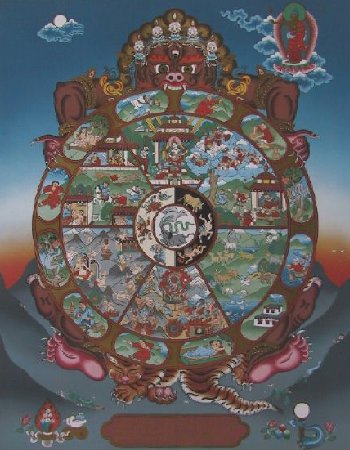 nd
another place where people sit there, biting their finger nails
forever on account of a five-minute sin.
nd
another place where people sit there, biting their finger nails
forever on account of a five-minute sin.
There are no such separated realms in the universe.
We know in scientific terms today that matter is a modality of power, that power is a field, a uni-field, a continuum, and that this field, being a continuum is throughout itself identical in essence. It can modalise itself in these six ways, anywhere whatever — and anywhere that a wave is produced in an ocean modifies all the ocean. And therefore, in the same way, any behaviour of a god affects men. We know it has done, in fact because the gods have got themselves written about by men. So in spite of their ignoring men, men have not ignored them. We know that men have actually written about titans fighting gods, like Prometheus. We know that men have written about hell, we know that men have actually studied certain kinds of unsatisfied cravings. And we know that men have studied the animals.
A peculiar thing about men is that they evaluate things. And they make this their mark;. that we are evaluating beings, we are very proud of our power of evaluation; and therefore in man we have a record of this.
We also know that the animals are impinged upon by men and interfered with, so that animals are not ignorant of the existence of men.
We know the beings in hell are worrying like mad about the other beings that are not in hell, and which are never with them.
We know that the hungry spirits are actually hungering for something that they haven’t got, therefore they know there is something other than themselves.
And we know that titans in pursuing power and moving away from the powerless also know there is something other than themselves.
So we can say that these six presuppose each other. There is a peculiar logic about the circle:
Thinking things done in time can last forever — is the gods.
Thinking things done in time can last forever is a belief of hellish beings.
The only difference, one thinks the good is lasting,
the other thinks the bad is lasting.
The titans have a pursuit of power
and an immediacy of response towards it,
the animals have an immediate response
but only towards a pleasant stimulus
and away from an unpleasant one.
The men have pride, and hungry beings have no pride.
And all these are functions of any being whatever in the universe. And they’re all classed as unenlightened beings — from which we can see that there must be, logically, an enlightened being who drew the circle in the first place. Some being had made an analysis of these six beings, and it must have been a being who had these six beings as six realms of himself. Because ultimately all knowledge is self-knowledge.
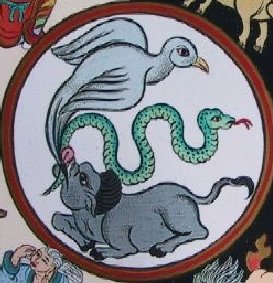 ependent
Origination
ependent
OriginationWhen this analysis was looked at very carefully, just as we say in inductive reasoning we write out particulars, and then we move in from the periphery towards the centre, we want to find out what it is common to all these beings who are unenlightened, that generated them as they are. And we find in the centre of this wheel, three figures: One is a cock, another is a snake, and another is a hog. [34:38]
Now they are shown biting each other’s tails, so we have a trinity here, generating a wheel of six spokes, six zones. The cock signifies desire, the snake signifies aversion, and the hog signifies the egoic consciousness. So we can say that all these six type of function, or six types of being, are generated out of three basic impulses: desire, aversion, egoism.
N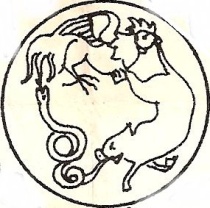 ow
if we like to think about this logically, these three presuppose each
other. This is the theory called dependent origination. You
cannot, without desire, constitute yourself as an egoic being. You
cannot, without aversion, reject that which is beyond egoic being.
You cannot be an egoic being, without desiring those things that
subserve your end, and feeling aversion towards the things that would
destroy you.
ow
if we like to think about this logically, these three presuppose each
other. This is the theory called dependent origination. You
cannot, without desire, constitute yourself as an egoic being. You
cannot, without aversion, reject that which is beyond egoic being.
You cannot be an egoic being, without desiring those things that
subserve your end, and feeling aversion towards the things that would
destroy you.
So these three central principles, desire, aversion, egoism, presuppose each other.
Now in European theories of causality, the general usage of the term presupposes that you set one thing up at the beginning and call it the cause, and then put the other things down and say they are effects. But in this expression dependent origination there is not causality in the European sense. There is a statement that they presuppose each other to be, so that they are coexistent , that egoism and desire and aversion co-exist, and the appearance of one is the appearance of three. You cannot have desire without egoic aversion, to that which would impede your desire. You cannot have aversion without egoic desire, for that that your aversion is protecting you from. You cannot have egoism without finiting yourself, fastening on something, and when you’ve fastened onto something you’ve drawn a circle, the things inside the circle you desire, the things outside the circle are threatening your egoic being.
So when we think about dependent origination we are not to think about it in the European causality sense, as if a cock caused a hog, and a hog caused a snake. These three are really three modal functions of a fourth power — which either manifests in this three-fold manner, or doesn’t manifest at all.
So the wheel of the gods, the titans, the men, animals, hungry fellows, and beings in hell, is dependently originated on desire-aversion-egoism. Therefore the cure of desire, aversion and egoism, is the same thing as escape from the wheel.
Now the escaping from this wheel is the whole meaning of all the religions of the world. This wheel, in its dependent origination, has all its zones presupposing each other. To get out of it, we have to conquer egoism, desire and aversion simultaneously. If you conquer one of those, you conquer the other two. If you conquer egoism, that is the idea that you are a finite being, then automatically and logically, in defining yourself as no longer finite, there is nothing outside you that you could desire, or that could give rise to aversion. Because in denying your finity, you logically assert your infinity, and everything is now included in the consciousness that liberates itself from the definition of egoism. Likewise if there is something that you dislike, and you conquer your dislike, you have conquered your egoic, finite response. And if there is something you desire to possess, and you conquer this desire to possess it, you have also conquered your egoic response, and you are no longer feeling the aversion for that which will stop you getting that which you want. So in a nice, logical way, this wheel in any one of its parts presupposes all the other parts.
Now it is spread out, and twelve other little symbols are placed around the wheel. And a little series of symbols are used to explain it.
We could give it that a blind woman gave birth to a potter — and the potter modelling clay a monkey — and it was so life-like that it had a dream in which two men were in a house boat. The monkey jumped in the house boat, and went in the house part, and it had six windows. And he looked out of the six windows. And while he was looking out, he saw a beautiful maiden and he wanted this, and he called her. Probably she was a monkey-maiden, and she came, and he felt pleasure. And she gave him a bowl of some lovely delightful mixture … she’s a lady, I think. And he suddenly developed a terrible thirst for this, and from this thirst he wanted to posses the lady who had given him the bowl. And this keening caused a relation with the lady, and this relation caused a birth. And this birth logically presupposed a death. Because once he had finited himself in this way, there was no way back other than by dying; that is, by rubbing out the whole fantasy.
Now if we ask what this blind woman is, we can say that the substantial aspect — remember we use H for gentlemen and M for ladies — when we say a blind woman, we mean that the substantial aspect of universal power vibrating produces form so that this not-knowingness — remember to know means to lock up, and sharpen, to formulate, this not knowingness — with its vibrating in this universal power, produced from itself, a potter, a formulator.
And this formulator produced from itself, consciousness of specific form. This consciousness of specific form is a monkey.
This monkey had the dream. This consciousness of specific form then saw two men in a boat.
And these two men symbolised psyche-soma, nama-rupa; the being that has two sides; the physical side and the psychological side.
The house with the six windows is your body, your vehicle with five senses and the common sense that links them making six.
Looking out of these five senses, messages come, and some of these messages are very pleasant. This causes us to go out, and we have a taste, then we want more.
And we cling to it, we relate to it, and out of this relation we get born, and because we are born we must die.
Now this whole cycle presupposes, in any one of its parts, all the rest.
Now if you remember when we said, let the paper represent the infinite power, sentient power, and we’ll draw the ripples going along in all directions, and we fill it up any way we like. Imagine this is the blind lady; it is the totality of all possible functions and forms. And if we superstress any bit of it which exists, we immediately make a specific form. And this specific form then causes the lapsing from consciousness of the infinity of other forms which we might have made if we’d have done this [draws something further on the white paper], we can make other form. Every time we focus our consciousness on a specific form we have stopped that same consciousness from focusing on an infinity of other possibilities.
And therefore we can see, egoism means no more than to focus consciousness down through a particular form, and then insist that this form is central to our being, and we are going to define the world from, and through this form. And that there shall be no other interpreter of reality other than the view through this window.
Now if we remember that the terminology was invented by some very intelligent fellow a long time ago, and these fellows embodied priest-king-scientist in one man. Each man was his own priest, his own king, his own scientist. He had to know something scientifically, empirically, he had to formulate rules, how to control the situation out of this, and then he had to go through a ritual performance.
As a ritual performer and blesser and sanctifier he was a priest.
As an enforcer of his rules he was a king.
And as an empiricist deriving information through experience he was a scientist.
So if we go back and look at ancient Egyptian civilisation — Indian, Persian, Chinese — wherever we go we will always find that the rulers embodied these three functions. Now your head is your king, your heart is your priest, your belly is your scientist.
The belly is your scientist because, of course the obvious way to test anything empirically is to them. This is seen quite easily in a baby. As soon as a baby can grasp something, it doesn’t matter what it is, mentionable or unmentionable, in the mouth it goes. Try it! — this is the scientist in the baby. You can tell by the baby’s expression that it has these two functions: desire, aversion. It has no pride at that level really, so it doesn’t mind looking horrid, because the thing that it has put in its mouth is horrid. And it will beam with delight, unashamedly and without pride, when it attains the power to stand upright for half a second.
So here we see in every human being the totality of these six realms exist. In every human being the generative forces of these six realms and six tendencies are egoism, desire and aversion. So that we cannot liberate ourselves from these silly, six-fold definings, without going to the root cause. People that don’t know that gods are simply attained human beings cannot get rid of gods in themselves — because they don’t know that gods are egoic beings of desire and aversion.
If anybody knew that the gods are subject to desires and aversions, and that the gods foolishly and erroneously ignore total reality, because they are enjoying the fruits of their previous activities which have conferred knowledge and power upon them, they would cease to revere those gods.
They might look at the titans as envious of those powers and decide they would try the titan role for a bit. But if they examine the dependence of the titans upon egoism, desire and aversion they will disown those.
If they look at men with their pride, they will say these creatures are doing nothing except measure, evaluate, egoism-desire-aversion.
If they examine the animals they will observe that they non-reflectively react in desire and aversion.
That the pretas, those powerless craving beings likewise are driven by egoism, desire and aversion.
And people in hell have been put there by their own erroneous definitions — by egoism desire and aversion.
So then you go back to say, how can I conquer egoism, desire and aversion within myself, the first thing is to see that the infinite ocean of possibilities is non-egoic, and as soon as you let go of your pet definition of yourself, you automatically become released. To do this you have to examine your desire-aversion, because your desire and aversion is the pattern of your egoism. If you like one thing and reject another thing, you are automatically wrong. So you have to examine the grounds of your desire-aversion to release yourself from your egoism.
Now the whole of the message that Christ gave in the statement if you die you can live, if you give up your life for my sake you will gain it — meaning for the sake of the Cosmic Logos. Or Buddha’s statement, that you can only gain freedom from this wheel by conquering that which led you into it.
Now remember Buddha flogged himself for several years, starved himself for several years, did all sorts of funny things; ascetity; and came out no wiser. And then, he was sitting depressed under a lovely tree called Bo, and a woman came up and seeing him looking miserable assumed he was a saint. So she quickly ran away to the village and got a bowl of milk. She brought the milk and put it before him. And he immediately became enlightened — because he knew that she had made a mistake, that she thought he was a saint, that she thought he could bless her, and therefore she went and got the milk. So she had given him the milk in order to get a blessing. And then he immediately saw that he also must have given something in order to get a blessing.
So he then analysed what it was he had given to get where he was, and the answer was very simple; he had given interest, nothing else. He had taken his being inwards to a particular from the infinite. He had identified himself. He had become fascinated by a particular image, and said; this is what I would like to be out of the infinity of possibilities. And in committing himself to this, he had committed himself to the whole cycle of birth, disease, old age and death — and if he didn’t become enlightened, rebirth, and repeat. So he promptly decided to give it up.
The word Trishna which is translated thirst, gives you the key to this, because its etymology implies a threefold function. And this threefold function is the one we’ve just examined; that egoism presupposes the desire for that which will support the ego, and aversion for that which will destroy it, and that either desire or aversion prove the existence of egoism.
If you see this threefoldness you can actually start not grabbing-at-things for which there is an automatic desire, and not pushing-things-away that you automatically dislike, but by re-evaluating the total stimulus situation to rise above the finite attitude towards it. To the people that can’t eat bananas, to people that can’t eat tomatoes, because they have a definition of these things, this definition stops them. There are beings that can actually swallow things that are poisonous to other beings. How they got able to swallow those things that are poisonous to other beings in the first place, was by not defining them as undesirable. And therefore we can assimilate total reality, providing we do not desire a part of it, and have aversion to the other part.
S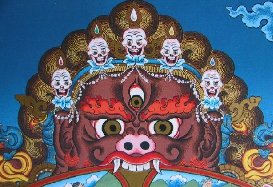 o
the peculiar thing about this, as in the nirvana of the Buddhists, is
that we are aiming not at a negative state — possibly Matthew
Arnold [Sir
Edwin Arnold (1832-1904)]
helped to give that negative interpretation to the Buddhist view in
his Light of Asia — we are not aiming at a negative state in
which you don’t want anything to do with reality, but a
positive state in which you can have something to do with everything
of reality, by not suffering from desire and aversion, or any of its
separate elements. We will now retire for refreshment.
o
the peculiar thing about this, as in the nirvana of the Buddhists, is
that we are aiming not at a negative state — possibly Matthew
Arnold [Sir
Edwin Arnold (1832-1904)]
helped to give that negative interpretation to the Buddhist view in
his Light of Asia — we are not aiming at a negative state in
which you don’t want anything to do with reality, but a
positive state in which you can have something to do with everything
of reality, by not suffering from desire and aversion, or any of its
separate elements. We will now retire for refreshment.
You will notice that this particular thing is a wheel, divided, and at the centre is contained the material we were dealing with last time. If you look at the illustrations in the different sections, you will find that they correspond with the gods, the hellish beings, titans etc., and if you periodically look at this diagram, it will help you to see how terribly difficult symbolism can be. But you will observe that it is a wheel, and that gripping this wheel there is a rather horrible demonic-looking figure, who is clutching and chewing at this wheel. Now this is to symbolise that the appetite of the German type Ungrund is busy chewing this wheel of existence. In other words, the whole of existence is actually being eaten by some primary appetite represented by the demonic figure. All time consumes its own products. Time eats his children. It is represented here with this demonic figure.
I’m going to say more or less what these particular symbols mean. And we’ve done the central bit. And we’ve done the six-fold bit, and we were going to talk about the twelve-fold division which is the outer part of that same diagram. And there’s a very peculiar dialectical relation between them.
You saw that in the case of the six sectors that we did, that the gods were opposed to the beings in hell. They had one thing in common: they were actually repeating something. The gods were repeating their enjoyment, and the hellish beings were repeating their punishment.
In the case of the titans they were opposed by the animals, and again they are driven: the animals are driven by pleasure pain, towards sense objects. The titans are driven by the will to power, but in the same world. They want to acquire the power, the material possessions, the signs of power which they think the gods have, and therefore they use all their energy to acquire those things which, to the animals, are a matter of instinct; the titan, going to these, with the consciousness of an egoic individual.
Then human beings were opposed by the hungry spirits, the impotent hungry spirits. And the human beings had a hunger like these pretas or hungry spirits, but the human beings were characterised by pride, whereby they conceal their hunger. The only difference between the human beings, or mankind, and these impotent hungry spirits, is that the type of being mankind can manage to obscure, to hide their hunger under manifestations of pride in their humanity.
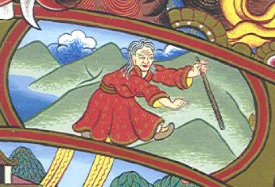 welve
Symbols in the Outer Circle
welve
Symbols in the Outer CircleNow we’re going to go on to the twelve, and see a peculiar symbolism, which is very subtle.
At the top here, number one, there is a blind woman. And when a symbol is used concretely in this manner, it can have many levels of interpretation. Now in all the religious scriptures based on the source literature from which the Judaic literature comes, woman refers to the non-intellective side of being. And man to the intellective.
Man, the male, is an intellectual being with a power of initiative based on his intellection. The woman is a volitional being with an emotive bias, and a materialistic orientation. The man is orientated into the world of mathematics, and geometry, and logic. The woman is orientated into the material world, the mater-ial world, the world of mother. And therefore in the religious work, in the major religions of the world, where it refers to a woman it is referring to a non-intellective something.
And therefore the blind woman here signifies a non-intellectual conative drive. It is an infinite power, it is the substantial aspect of reality, which in its spiritual aspect is perfect self-illumination. So the blindness of this woman is really the blindness of a basic universal drive that is refusing intellectual formulation, because it is determined not to be cornered by any kind of logic. It is pursuing a certain end, driving towards it, and it is not doing so by logic. Therefore it is represented here as a blind woman.
The word there in the original, Avidya, we can translate, not as ignorance as the scholars do, because ignorance means wilful disregard of some object. We are translating it as nescience, as simply not knowing in any specific sense. Those of you who are married – I mean the men who are married — will understand what it means to have this kind of emotive disregard for the logic that husbands produce. There was a drawing on one occasion in Punch of a woman saying to her husband, I am not going to be diverted by mere fact. Now this is exactly what is signified by this blind woman. But this blind woman is power.
Remember all power basically is sentient, that is, it feels itself, it feels its own movement. It is a potential of self-realisation, but at this first stage it has not bound itself, it has not committed itself to any particular form, because it feels any particular form to be a limitation on its potential infinite enjoyment. It is seeking, not a finite pleasure, but an infinite one, and therefore it continuously keeps on the move. And it is blind because moving without turning round is a continuous conative drive with no object to see. It is blind because it is objectless. And it is objectless because it is committed to infinite movement.
The opposite of this is a scientist, dedicated to the consideration of a specific type of existence. Like a man I know who has studied the stress/strain, for forty five years, of the left foreleg of the common housefly. And he has photographed minutely this particular thing, because he has a theory about it. And he has shown some remarkable things about left-footedness in the housefly.
Now this is really quite important, because the two presuppose each other.
The non-objective continuous seeking of this blind woman, the seeking without finding, is exactly the opposite of the dedication to one specific form by the male empirical scientist. But in the movement of this blind power, there is an inevitable overlapping, an intersection, the spinning produced by this intersection [8:31] carries us in the second place where we find a potter; a man busy making pots.
N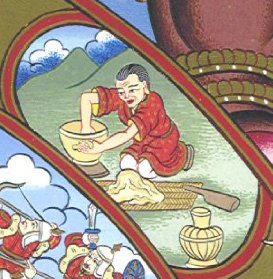 ow
the word samskara here is a word, it’s exactly the same word as
samsara — which means the whole of power movement — plus
the letter K. When we introduce this letter K into this word, it
means close it up. Therefore the symbol of the potter here
means a power that is making containers. Now if it weren’t
for these containers there would be no pluralisation of appetite, the
drive of the blind woman would be infinite, and eternally
unsatisfied, because being infinite it cannot in its movement come to
a term, and therefore it cannot finish something.
ow
the word samskara here is a word, it’s exactly the same word as
samsara — which means the whole of power movement — plus
the letter K. When we introduce this letter K into this word, it
means close it up. Therefore the symbol of the potter here
means a power that is making containers. Now if it weren’t
for these containers there would be no pluralisation of appetite, the
drive of the blind woman would be infinite, and eternally
unsatisfied, because being infinite it cannot in its movement come to
a term, and therefore it cannot finish something.
But when in the overlapping of the movements of this blind woman — in its intersection of the forces which it represents — there arises spinning. Then each one of these zones of spin, a vortex, creates a little sphere which is just like one of the amphoras dug up in the byzantine boat last night, for those who were watching, and therefore the second one shows formation and pluralisation of forms, so that a multitude of vehicles of the blind woman are produced.
So now we have to imagine that the blind woman, through her own blindness, has through her own non-seeing movement met herself — being forced by her non-observation, her non-science, to observe things that she is not looking for, namely finite forms. When infinite forces move, because they are infinite they are not finited to any specific direction. The result is that they produce within themselves zones of intersection, zones of spin, vortices, ensphering processes. Each one of these is a pot, container, a vehicle for the same blind woman. As we go round we will see how we add each one that we have dealt with to the next one, to explain it.
Now this wheel is a wheel of dependent origination. It is not a Western causal concept of the temporal order, in which one thing earlier in time has caused another thing later in time — like the shunting of railway carriages, where one of them is bumped by the engine, and bumps the next one and so on down the line. This is such that you can start at any section of the wheel, and if you try to define it you will have to define all of it. [11:31] Any part of it is presupposed in all of it, and all of it is presupposed in any part of it.
You know that in the case of chemical elements which were pursued for a long time by the scientists as ultimate simples, the combination of which would produce the universe — but when they found these chemical elements in the atomic scale, these elements have a peculiar bias, a valency tendency. A tendency to join with other elements, and this presupposes that these apparent simples are being bound together by invisible forces. Now the invisible forces of the whole, are, by their movement producing ultimately, these so-called material particles, simply as centres of reference. You cannot understand carbon unless you understand all the valences of carbon. You must see how carbon, added to other things, produces various compounds, and ultimately organic forms. And therefore when you are considering any one of these, it is necessary to remember all that you have already thought of all the others, and to continuously to define any one in terms of the eleven others, or the other eleven.
The potter therefore is nothing but the motion of the blind woman, which, through its non-observation of where it is going, through its infinite motion, must cross itself, and in its crossing produce vortices, spheres, containing processes. And this is the potter. Pot-ter itself implies that this power has become embodied in the terra, in the earth, by this rotating process.
Now if we imagine, once these vortices of spheres have been produced by the dynamic rotation of energy of this blind primary conative drive, then we have to deliberately postulate space, which is power, not the dark cold empty Copernican space, real space which is full of power, spinning throughout itself, so that just as the wind, if you watch its evidence on the waves of the sea, will show you that it blows in little puffs. It doesn’t blow on a straight line front, it blows in little spherical puffs. In other words it is making spheres, it is rolling as it’s going along. And each little roll ensphering, produced by this blind conation within the infinite, is considered from its formative aspect, the potter. So that when we are talking about the potter, the principle of the production of finite containers, spheres of influence, or finite beings, we are simply talking about the blind woman producing unavoidably these ensphering processes — these vortices.
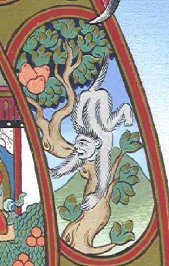 he
Monkey
he
MonkeyNow we want to consider how the potter becomes the monkey. The blind woman who gave birth to the potter, the potter who modelled the monkey.
If we imagine space, which is sentient power, to be spinning, making spheres everywhere, and each one of these spheres is, by its rotation, relatively separated from all the other spheres, then this apparently separated sphere is a monkey. A monkey is the key to man. It is the evaluator, the consciousness, the sentience, insofar as it is locked up inside one of these spheres.
Now the term vikyama[?] here, for the monkey, which the scholars translate consciousness, without defining the word adequately, really means that sentience, within one of these spheres, because it is ensphered, is being stimulated from all round itself in the six directions, north, south, east, west, up and down. And in the process it is being presented with stimuli from other spheres. And it is therefore continuously looking about for the source of the stimulus.
Now the only way we know, as finite beings, that there are other beings, is because we do not initiate every change that occurs in our body. If you think very carefully about this, and you think to yourself there is a noise coming from somewhere in this room. Now I feel that I am responsible at this moment for this particular noise. Now the only evidence you have that this noise is coming from me, is that you are not initiating it. And therefore because you are not initiating this noise, you postulate another being [17:08] as cause. So that this stimulus which arises in your consciousness, and which you have not initiated, is your sole evidence that there is an external world. And therefore it is the cause of you believing that there is an observer and an observed, and that the two are not identical. This makes it that the monkey see two men in a boat [17:36].
Now the two men in the boat — nam-rupa, this term — nama means name, rupa means form. Nama is the actual movement within your substance which happens in this dual situation, and the movement within your substance when you listen to it, you call that a naming process. It is an actual moving of your substance that you listen to, when you are thinking. And that form which arises in consciousness from the movement of your substance, which is the naming process, is always correspondent with the name. So if I say the word pyramid, and the word sphere, then you get two different images, coming in your mind. An empiricist might say this is a product of your education. But if we go back historically it won’t matter, because the educator is the stimulus situation.
T he
first men who shouted pyramid when they saw a shape sticking out like
that, did so as a spontaneous reaction to a stimulus caused by a form
like that. What they saw, and the emotive response to what they saw,
were always correspondent. Some words were obvious: the onomatopoeic
words, splash, bang, wallop, and so on, these words tell you that a
given thing, perceived or experienced, has a correspondent emotional
response, which coming out of the vocal organs expresses itself as a
word. The result is that the collection of names inside you, and the
collection of forms you believe to be outside you because you didn’t
initiate them, allow you to divide the world into psyche-soma. Into
soul and body. Psyche; soul: Soma; the body. And therefore because
you feel your own sentience inside your skin, because you are
identified with processes inside your skin, and you talk to yourself
inside your skin, and the words you use inside your skin seem to you
to be your own products. When you say boat, when you say man, when
you say monkey, something arises in your consciousness from these
names and you believe that these names are inside you. They are
mental process and they don’t appear to be causatively
connected with the boat, with the monkeys, with the men, outside your
skin. And yet there is a correspondence. And this fact leads you to
believe that you have a physical body, separate from your own psyche.
As you do not initiate certain of the changes that occur in your
consciousness, you attribute these changes to beings beyond your
consciousness. And you have a central consciousness of your own to
which you can turn, and inside which, if you practice, you can
isolate yourself and concentrate with two radios on and a dear friend
explaining a very interesting thing to you, in which you have no
interest. You can actually gather yourself together, you can smile
and you can say yes, yes, no, no, in the right places.
he
first men who shouted pyramid when they saw a shape sticking out like
that, did so as a spontaneous reaction to a stimulus caused by a form
like that. What they saw, and the emotive response to what they saw,
were always correspondent. Some words were obvious: the onomatopoeic
words, splash, bang, wallop, and so on, these words tell you that a
given thing, perceived or experienced, has a correspondent emotional
response, which coming out of the vocal organs expresses itself as a
word. The result is that the collection of names inside you, and the
collection of forms you believe to be outside you because you didn’t
initiate them, allow you to divide the world into psyche-soma. Into
soul and body. Psyche; soul: Soma; the body. And therefore because
you feel your own sentience inside your skin, because you are
identified with processes inside your skin, and you talk to yourself
inside your skin, and the words you use inside your skin seem to you
to be your own products. When you say boat, when you say man, when
you say monkey, something arises in your consciousness from these
names and you believe that these names are inside you. They are
mental process and they don’t appear to be causatively
connected with the boat, with the monkeys, with the men, outside your
skin. And yet there is a correspondence. And this fact leads you to
believe that you have a physical body, separate from your own psyche.
As you do not initiate certain of the changes that occur in your
consciousness, you attribute these changes to beings beyond your
consciousness. And you have a central consciousness of your own to
which you can turn, and inside which, if you practice, you can
isolate yourself and concentrate with two radios on and a dear friend
explaining a very interesting thing to you, in which you have no
interest. You can actually gather yourself together, you can smile
and you can say yes, yes, no, no, in the right places.
It’s marvellous stuff, the substance of the psyche — you can conduct several conversation simultaneously with the interest in the right places, and not hear anything at all because you’ve been very busy watching out of the corner of your eye that fascinating BBC2 crossword puzzle. Now this means that your two lives, your apparent body life and your apparent psychic life, are simply the product of the potter or vortical spinning, within this primary universal conative drive.
So: two men in a boat. The boat is your being, which in its gross manifestation is your physical body, and the two men are the two conceptual consciousnesses that you have. One of your consciousnesses you call the sensational one, the sentient one, and this is the one that makes you think there are things outside yourself. And the other one is the one that you think internally is your real self as opposed to other selves.
You think you are a soul, you think you have a body, and you think there are other bodies outside you, and which by inference have souls. And all this is caused by the samskaric activity of vortical spin, or the potter. So the dualism of the inner and outer self arises from these two men in the boat.
Now the two men in a boat — of course as they’re in the boat all the time it has to be a house boat — so they have built this house within the body boat, and they have drilled holes so they can watch the external world. And these holes are the five senses, and a special one called common sense meaning the sense that is common to the five. So in the house with the six windows, what is referred to are the five sense organs, plus that unifying something which is called common sense.
Now this house with the six windows is brought into being by this potter process, having isolated zones of space — remember space is sentient power — and within each zone the mental process, the monkey, has been under stimulation, and through this stimulation has given rise to belief that there is differentiation between — the psyche, the observer — and the soma, the observed. And because it believes there are external beings, it has drilled holes in its own being to peep out of, and see what is going on. So the sense organs are actually movements from within to meet the external stimulus.
If you examine the eye you will find that the eye has been built by light. The sun has created the eye. Sound has created the ear. Perfumes have created the nose, and so on. Each sense organ has been created by the necessity of dealing with certain orders of stimuli coming in. And therefore this Sadaya, this word means being-intersection continuously. This word which is referred to as the creation of the six sense organs, really means beings interfering with each other continuously. And those things which you do not initiate alarm you, and you grow your sense organs in order to peep, and see what is there. [25:01]
So the sense organs have a peculiar duality, because stimuli have a duality. Some of them are assimilable, and therefore pleasurable, and some are not assimilable and therefore painful, and therefore your sense organs are on the alert to discriminate between pleasant and unpleasant stimuli. The same nostrils that can flare with delight, can also screw up when they get the wrong kind of perfume. The same eyes that can open with delight at a beautiful picture, can narrow critically if they don’t like what they see. So there’s a dualism in the sense organs themselves.
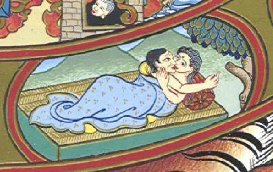 he
Pair of Lovers
he
Pair of LoversNow in the sixth position here, there are a pair of lovers. Funny thing about this symbolism, it is made difficult on purpose. If we were to run round this circle with the full meaning of what these things mean, it would be so logical in its development, the mind would say, yes, yes, yes, all the way round, would recognise it and dismiss it, because it would understand it, perfectly. And therefore the symbols are made quite difficult, so that we can actually work hard to get hold of it.
If we say, let the sound one be used to symbolise anything circumscribed with a circle — call it unity. And then the same sound uttered again, another one, and the sound two shall be considered equivalent to one plus one. And if I say twice one are two, the head nods, and says, simple, so what? …and dismisses it.
Everything that the being comprehends too quickly, it throws away. Only that comprehended with difficulty is retained. And therefore the symbolism is made difficult. Women understand this more than men. They understand that if they are too easy to get, they will be dismissed. We won’t go into the psychological causes for that, but if a girl falls in love with a boy and says to him first time, I am in love with you I will go anywhere in the world with you, you care to say I am yours forever, you may put your jackboot in my upturned human face and it won’t turn me away, then this boy will interpret: well I’ll have a look around elsewhere first, because that one is fixed. [27:31] Now this is a tendency in sentient power. That which it knows, it dismisses. Let’s remember that.
So here, a pair of lovers is used to represent sparza, which means contact. Now when contact occurs between A and B, then there is stimulation of A by B, and B by A. So the pair of lovers here really means stimulation.
Let’s go back a moment and look at the logic of this. We have an infinite blind urge. It is blind because there is nothing to see. If you look at the word blind and look at the word lin in it, and the word linen and suchlike words including Lincolnshire, and Lancashire by sound-shift, the thing means weaving. Imagine infinite power as a weaving, continuously, and that these peculiar weavings are themselves power threads, and all the threads are self-moving. They are not moved by something other than themselves, like material threads are moved by a blind weaving woman. These very threads are sentient power, and they are searching, they are moving themselves. [28:51]
So we have this infinite self-weaving power, and in its weaving is at every intersection point creating spin. This spinning is the potter the finite container the ensphering. This potter encloses sentient power thus produces a finite mind, the monkey, which finite mind, because it is finite is stimulated from all round it by an infinity of stimuli, and thus its consciousness is split by the stimuli into bits. So the monkey is hopping about all the time under the influence of the stimuli.
A person who is unintegrated is at the mercy of the stimuli that come. When Carl Jung talks about individuation, in its fullest sense as the highest aim of universal consciousness, then he is referring to this fact: that until you integrate all the elements of your being you are at the mercy of the stimuli that come to you . There’s this quite logical weaving of sentient power — self-interfering makes the potter — each little pot or sphere produced is a little monkey — each little monkey, because stimulated from outside gives rise to the concept two men in a boat, psyche-soma my inner processes and that which is beyond the limit of this between the skin surface of my body. This makes me draw holes in my body.
Those of you who have enough time to just go through the morphology of a developing human being from the egg, will be completely fascinated by the way the sense organs are actually grown from within this being, outwards to meet their stimuli. The sense organs are produced, and there is contact between the external world and the sense organ. And this is represented as lovers, and the lovers are quite simple, really. Because the lovers are simply the inside and outside of this sphere which, the potter has created. That is, your psyche is a lover. What he loves is total reality outside himself. So that he has a tendency to extend his understanding, his power, his grasp of reality beyond himself. He is loving the world.
Simultaneously the world is loving him, because he is a centre of integration possibility. All the energy going out from an individual human being into the world, his pleasures and pains, his likings and dislikings, his graspings and failings, the rejection which he undergoes — all these things are simply the relation between two lovers: yourself within your skin, and the universal beyond your skin. Your interest in the world is exactly equivalent to the world’s interest in you. All the world loves a lover. You are a centre of potential integration and the world is a potential of individual experience. The two presuppose each other.
We see here there’s no question of priority of universe over individual, or individual over universe. These two come into being simultaneously. The skin comes into being as a result of the play of forces from any centre, to the space around it. And therefore six, the lovers — the number six, means here, sex, and therefore the lovers. We’ll see over there later another function of sexual union, but here it means the contact of your sense organs with the external world, and the contact of the external world with you as an individual point of reaction.
The biggest error of empirical science is to believe that an empirical scientist is attacking the universe to discover its secret, and that the universe is not attacking him to make him discover its secret. Those who realise that the universe is actually attacking man, to make man individuate, to make man integrate so that man can understand the universe — because only through man can the universe understand itself. There must be a centre of individuation, of integration, in order that the universal energy can focus and concentrate itself, and from that point of individual, integrated consciousness, look back at the universe, and realise itself.
This is why in Christian theology man is created a little lower than the angels — the angels are archetypal forms – but is destined to be higher, because the angels are separated from each other logically according to categories, and one angel cannot become an angel of another category.
Thus intellectual elements cannot become affective elements.
Affective elements, feelings, likings, dislikings, are not conative drives.
These three are different and one cannot become the other.
So there are angels of the intellectual hierarchy, angels or archetypes of the affective emotive hierarchy, angels of the conative power-drive hierarchy, and these angels cannot get out of their category. But a human being can get hold of all the angels from the three hierarchies, and by work, individuate and integrate in himself, so that he is then better than the angels. This caused quite a lot of jealousy in heaven at one time, and the reverberation produced our best philosophical arguments.
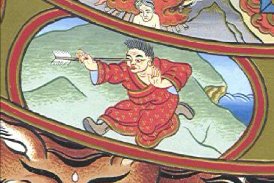 rrow
in the Man’s Eye
rrow
in the Man’s EyeN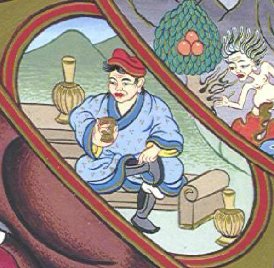 ow
once we’ve got the contact, we go down here to seven. There is
an arrow in a man’s eye, who bhedana here, means a
continuous process of affective response. That is to say, that when a
stimulus comes to you, you can either assimilate it at an appropriate
rate and like it, or you cannot and to that degree you dislike it.
But if you like this thing, you have a preference. And this
preference is that something will be present with you, or if it’s
unassimilable, that it shall be absent from you. So the arrow in the
man’s eye means the mood that arises logically from the contact
of yourself with your external universe.
ow
once we’ve got the contact, we go down here to seven. There is
an arrow in a man’s eye, who bhedana here, means a
continuous process of affective response. That is to say, that when a
stimulus comes to you, you can either assimilate it at an appropriate
rate and like it, or you cannot and to that degree you dislike it.
But if you like this thing, you have a preference. And this
preference is that something will be present with you, or if it’s
unassimilable, that it shall be absent from you. So the arrow in the
man’s eye means the mood that arises logically from the contact
of yourself with your external universe.
N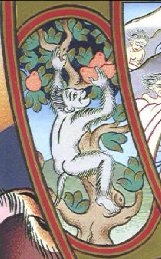 ow
this moon, this affect, this liking-disliking, passes into the next
phase represented by a drinker served by a woman. Remember these
symbols are not just fabricated to make the thing look nice and
romantically interesting. They have meaning. Woman refers to the
conative and affective side of nature, and man to the intellective.
And in this eighth position there is Trishna which is thirst, and it
is a desire that that pleasant affect, that pleasant emotion, shall
be re-experienced. And it is served by woman. That means that once
the affection is roused in you, your own non-intellective side, that
is your female side, will want to repeat this pleasant stimulus. So
that you — the male, the drinker, the differentiator, the
selector — are being fed by your own conative, emotive,
non-intellective side.
ow
this moon, this affect, this liking-disliking, passes into the next
phase represented by a drinker served by a woman. Remember these
symbols are not just fabricated to make the thing look nice and
romantically interesting. They have meaning. Woman refers to the
conative and affective side of nature, and man to the intellective.
And in this eighth position there is Trishna which is thirst, and it
is a desire that that pleasant affect, that pleasant emotion, shall
be re-experienced. And it is served by woman. That means that once
the affection is roused in you, your own non-intellective side, that
is your female side, will want to repeat this pleasant stimulus. So
that you — the male, the drinker, the differentiator, the
selector — are being fed by your own conative, emotive,
non-intellective side.
Now this automatically produces the grasping at the fruit. That is to say, if a thing is pleasant enough for you, not only do you want to re-experience it, but you want to guarantee that you re-experience it, and therefore, you wish to possess it. Again it follows quite logically from the [37:40] contact of the senses and affective response, I like-dislike, I move toward the likes, I would like to have them again, and to guarantee I have them again, I would like to own them. This brings us to the picture showing sexual union of a man and a woman.
N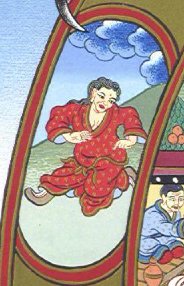 ow
bhaava, becoming, here: a union of the man and the
object that he decides to appropriate. This man wants to own the
source object that will allow him to repeat his pleasant experience.
And in so doing, he comes into union with that object. If we were to
interpret that this pair of lovers and this sexual union over here
simply refers to the sexual activity of a man and a woman in the
world, it’s most external interpretation, I wouldn’t mean
very much to us. It would simply be an illustration of something
that’s going on, but it wouldn’t tell us what to do about
it.
ow
bhaava, becoming, here: a union of the man and the
object that he decides to appropriate. This man wants to own the
source object that will allow him to repeat his pleasant experience.
And in so doing, he comes into union with that object. If we were to
interpret that this pair of lovers and this sexual union over here
simply refers to the sexual activity of a man and a woman in the
world, it’s most external interpretation, I wouldn’t mean
very much to us. It would simply be an illustration of something
that’s going on, but it wouldn’t tell us what to do about
it.
But here it says to us quite simply that this bhaava, this becoming, this being-development arises because the desire for repetition of the pleasant stimulus has produced a possessive appropriation of the object, and the man then becomes unified with his object. This is a man in any field of activity at all, who, seeking a position that will give him the power to repeat this pleasant feeling, actually becomes one with his activity. The man who is identified with any kind of institution, structure, organisation, church, state, whatever it is that he gives himself to, so that he can no longer separate himself from that being; this is represented by the sexual union.
Now, from the union of this man with his object, which he now owns, there emerges another one: the woman giving birth. ???Dyatu????????, throwing out to try to objectify, to establish a dynasty, to say that because I have got this object and this object is so terribly valuable, I must make children to take my place at my desk, from which I give out the orders that guarantee that I will retain my hold on this desirable object. And the development of his organisation, this organisation developed beyond its original is his child. From the business point of view it is subsidiary organisations which spread throughout the world as children of a parent organisation. And the man who is so identified, is living and extending his energy in this way.
F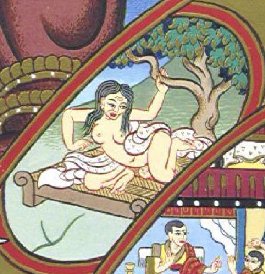 rom
the point of view of material existence, at the physiological level,
the sexual union produces a physiological child. And this child is
the objective projection through time and space of the intent of the
parents to perpetuate their affective enjoyment of that object to
which they first attached themselves. We see this most obviously in
the great ruling houses of the world — from Babylonia, India,
Egypt, Greece, Rome, to our own day, that families who have by
effort, by will, by intelligence, by cunning, by whatever means, have
established an objective hold on a power situation, like to transfer
this to their children, the military monarchies and so on, because
they are identified with the issue of their own being. And therefore
they give birth. The big organisation gives birth to a smaller
organisation. The great empire has colonies, the great business has
subsidiaries, and the man/woman in their relation bring forth a
physical child.
rom
the point of view of material existence, at the physiological level,
the sexual union produces a physiological child. And this child is
the objective projection through time and space of the intent of the
parents to perpetuate their affective enjoyment of that object to
which they first attached themselves. We see this most obviously in
the great ruling houses of the world — from Babylonia, India,
Egypt, Greece, Rome, to our own day, that families who have by
effort, by will, by intelligence, by cunning, by whatever means, have
established an objective hold on a power situation, like to transfer
this to their children, the military monarchies and so on, because
they are identified with the issue of their own being. And therefore
they give birth. The big organisation gives birth to a smaller
organisation. The great empire has colonies, the great business has
subsidiaries, and the man/woman in their relation bring forth a
physical child.
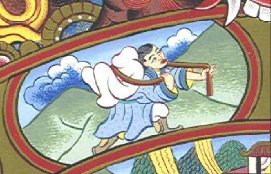 an
With a Corpse
an
With a CorpseNow once a finiting process has brought itself to its term — and there is a natural term, an end beyond which any given form cannot be developed — when this end is reached, then the necessity of death arises, because one cannot be released from a thing into which one has put one’s energy, other than by talking that energy out. And if the energy put into it is too great, the being has not sufficient energy to pull himself out of it. And therefore his energy is committed to it, as long as that form will function and pay back in this sought affect, this sought feeling, this sought emotion. And therefore the necessity for the destruction of the object. Without the destruction of the object, that identified psyche cannot be released.
Imagine a man who was a king by his own effort in a little valley in the middle-east. Supposing nobody had invaded this valley and he never went outside, because he didn’t want to know. He’s had all his pleasures inside this valley. And he was surrounded if you like, like the Shangri-La story, he was surrounded with a protective ring of mountains, and nobody knew he was there. Cut off from the external stimulus of the world, enjoying himself in his established pattern, he would be fixed. And within that centre, could not change his behaviour, once he had reached the logical term of its development [44:10]. He will be pinned. Now when any civilisation has reached this end, then luckily, historically, there have always been some other beings outside that enclosed situation, outside the Euphrates-Tigris valley situation, who have rushed in and knocked over all the buildings, captured all the ladies, moved them to another country, and killed for his own sake, the unfortunate monarch who had become identified. And therefore death is a necessity of release for an identified being.
Now there is no death, other than identification. The infinite sentient power is infinite life, and death means division, it means separation, it is the potter, the creation of the vortex, which lays the foundation of the necessity of death. The identification creates the necessity of the breaking of the identification. And therefore this word death here, maraNa, means no more death; that the substance, which is the blind woman, shall continuously differentiate. It is doing this all the time, and producing, by its potting activity, continuous zones of possible identification — and these zones of identification, continuously produced, are local deaths. A cancer in the body, generally, is a number of cells that for a certain reason to do with subdivision, have gone to the term of subdivision beyond which they cannot go, and then started to fuse together again, and in so doing they have grown outside the control of certain parts of the organism, so that they are now autonomous beings within the being. They eat your food, steal your nourishment, and grow without integration of function with the rest of your body. So in the same way, this death only means that locally there is identification, and a refusal to integrate function with the environment. There is no other death.
Now, when we’ve gone round here logically we see that it is really a very simple thing. If we go round it very quickly we can dismiss it.
Universal energy by its processes formulates.
The pluralisation of formulation produces individual minds locked inside their bodies.
This locked mind inside the bodies has a dual aspect, the inner psyche the outer soma.
This necessitates the drilling of portals in order to see the external world.
This results in the contact of the external world and the sense organs.
This results in the arising of feelings, I like it/dislike it.
This results in preference thirst for certain experiences.
This results in grasping, possessive appropriation, in order to repeat these things.
This results in the binding of the man and the object.
This results in giving birth along the line of development of that object to its term.
And this reaching the term is the necessity of death.
If we say it very quickly like that, we can say, that’s how it is — quite easy. We’ve understood that and then we can go on, forget about it … hence the difficulty. Difficulty introduced on purpose, to make you realise what it means.
Now it is arranged in this way, round in this manner, not accidentally, in pairs of opposites. Just as there’s a real opposition between the gods and the beings in hell — both ignoring something; the gods were ignoring the finite nature of their heaven, and the beings in the hells are ignoring the possibility of escape from hell — so when we look at these twelve, they are also related.
There is a blind woman and there is an arrow in a man’s eye. The blind woman by her movements has produced a situation in which it is possible to hit a man in the eye. That is to be made to see dialectically, that blindness begets the vision. The wounding of the man, the arising of the feeling in him, I must see more clearly to get what I want, is the dialectical product of the blindness of the original primary conation.
Now the potter here, formation, has produced a woman holding one of these pots — that is his will — in order to drink out of it. There’s a real relation between the opposite concepts. Unless we make pots we cannot hold our lemonade in them. If we can’t do that, we can’t drink. So the formative process here, is a precondition of the possibility of drinking; that is, of taking it from one zone and putting into another zone. Each zone can then specialise in a certain kind of self-being and in specialising is depriving itself of something else that it might have had.
To specialise is to deprive yourself of an infinity of other possibilities, and thus to create an appetite for what you are not. And this potter, therefore, begets the situation where you can have a thirst. There’s a real meaning in the opposition.
Now the monkey, the closing of the mind, the finiting of the mind, makes possible the appropriation of things to add to this mind. Again it’s not accidental that this mind, reacting to stimuli from all around itself, is watching pleasure-pain, pleasure-pain, and reaching out, and grasping those things that give the pleasure, and appropriating to itself all those pleasurable, and therefore pushing away those things that are not logically consistent with the things you want. A monkey begets in this way.
The two men in a boat, the psyche soma, reject the possibility of this union.
Now we see here a very subtle thing, that a very valuable inversion of polarity is possible. The man and his own being can be considered as man/woman, in which your physical body, your material self can be viewed as female because it is full of non-intellectualised tendencies. The body is full of urges — not yet intellectualised. Your intellect is masculine to your body. Therefore the two men in the boat, psyche/soma, by means of names and forms, can produce a new kind of unity — the unity of a man, a psyche, with his own being, his soma.
Now this is the one that’s most important in all religious teachings — that a man shall come to terms with his opposite pole.
Now in certain psychologists — Jungian psychology is fairly obvious — there is a fairly clear statement that a man has to come to terms with his opposite pole. That the male must come to terms with his femaleness, and the femaleness with the maleness. But there is not enough clarification that your femaleness is your physical body, and your maleness is your pure logic.
Your physical body is full of wants urges, desires, aversions, it likes and dislikes, some things it thinks are comfortable, and some are not, and it tends to move towards the comfortable, and away from those that are not. In other words, your physical body acts just like a woman. It wants what it wants when it wants it. And your pure logic inside, has the job of bringing this woman into subjection to its authority. The man that cannot control his own physical needs for comfort and pleasure, cannot control the woman in him.
The opposition spirit and body is exactly the same as the opposition woman man. When St. Paul said Christ is the head of man and man the head of woman, Christ was the personification of logos, cosmic reason2. The man who can see a purely mathematical-geometrical-logical proposition is really male. The man who can make his body obey that logic, is a hermaphrodite. This is the kind of hermaphrodite that Christ is talking about, when you can make your physical body obey the logic that you know is applicable in that situation. That is the real hermaphroditic saint.
Now, again, the house with the six windows — gives birth. Because when we look outside through our sense organs, we actually give birth, psychologically, to our own interest. We don’t ordinarily notice this fact: that we are already equipped with tendencies from our ancestors, to go into the world and interpret it, to give birth to interest, to put that interest upon an object, and to see that object as desirable, and not know that we have made it desirable. We have given birth to an interest.
Birth means thrust it out of that house, out of that being.
When you look upon a thing and select it and say, that’s worth attention, that’s worth more attention, that’s worth slightly less attention, and so on — looking at beings and things, antiques or whatever you’ve got — when you are doing this and believing that you are seeing value in things, if you forget that the value you see is only the value you have yourself fabricated, self here equals your ancestral protoplasmic experiences, and thrown into the outer world, until you realise this, you are at the mercy of your own formulations. You are giving birth to evaluations.
And every evaluation that you make in this way ties you. You project your values. You decide what is good, bad or indifferent in the world; you energise your body to go and get it; you project your interest and fasten yourself in the process of this projection, upon some specific being in the time-matter world. [55:41] And thereby you precipitate, here, the man with the corpse.
Every pair of lovers in the finite world, putting their arms round each other, each is putting his-her arms round a corpse. When you get married, if you don’t die simultaneously, one of you will have to bury the other, unless you leave it to the corporation [laughter]. Now we see here that there’s a very interesting kind of dialectical process.
There is also a relation in that a certain area is allotted to the gods, to the titans, pretas, hell beings, animals and men. Now if you look at your diagram and meditate upon those facts, you will find that there’s a very intimate relationship between the beings that we discuss in the six sectors each one of which covers two zones of the twelve. And there is a very good meditation.
Do not think that it’s accidental, that these things are placed in this way. They are placed there by a consciousness which sees the whole thing. It is not a thing worked out empirically from the sense world. It is a thing that is projected from whole consciousness. The symbolism of a wheel like this, the symbolism of the Christian trinity, of the ??????? of the Hindus, or any of the great religious concepts, is not something arrived at by a man empirically building from the ground. It is something that the whole consciousness sees and precipitates, and then the empirical ego, your little individual self, can meditate upon that precipitated form, in order to develop itself back to the consciousness of its source. [57:49]
Question from a listener: Tell me how all these characters were connected. In the circle you were saying how they form a complete circle even, if there’s the same connection between the corpse and the blind woman, ……
The reason I didn’t do that course is because we would have had to go round again. The connection actually as we’ve said before: this is a wheel, not of a serial causation not where one thing in front of another in time, causes a following one, but the whole wheel itself is power, sentient power. This wheel is a real existential wheel within each individual, and within the universe as a whole. So the connection between this man with the corpse, between man and his own body, between life and death, is that, after going round, and by this process of identification with a finite object, necessitating the destruction of the object, as in the case of a physical body, when you get this body, you got it after hard work and choosing, when you develop it, you choose the mode of its development, and when you reach the term of its activity, so that you consider yourself sufficiently frustrated by it to realise that it cannot fulfil your intent in the way you hoped it would, then you vacate it.
Actual physical death is not caused by disease, it is caused by people vacating bodies with a sufficient number of impediments in them to make it not worthwhile to remain in them. Some people give up the body, with no physical symptoms. X-rays find nothing, and these people die. Some people persist for years with the most terrible diseases, because …did somebody laugh then?
Yes I did. I suddenly thought ….[unclear recording of this response…]
They have a motive actually for persisting, but the actual immediate cause of death is quite simple: it is vacating the vehicle because the psyche inside it has now conceived it to have reached its term. Identification is death. And the death of the body with which one is identified, is the precondition of the release of consciousness from the specific form to which it has committed itself. So when we come to the man with the corpse — remember the corpse is simply your body — the man, man means evaluator, a man is a psyche; the psyche is carrying the body with it. You are carrying death about with you, as long as you have a physical body. And when you get fed up with the limitations imposed upon you by this body, then you give it up, and this is death.
Now the consciousness, in going round the wheel, going through its experiential cycle, has informed itself — that is, put form by deliberate evaluation, within itself, of the external situation. It photographs events and objects of the outer world, inside itself, and it does this so fast that it doesn’t have time to pattern them properly. It is always running from moment to moment. There are not many people in the world, not everybody in this room will do what I am saying not many people do, because it is very special group of people, of course.
All the people in this room, when they go to bed at night, they deliberately look at the moment of getting into bed, and then they play the whole of their day’s experience backwards, to when they first woke up. And they will not allow themselves to go to sleep until they’ve done this, as an essential ritual in self-comprehension. Outside this room of course, people don’t do that [laughter]. They just feel tired and go to sleep [more laughter].
The result is that ordinary mortals have no real integration, and consequently when death occurs, when a sufficient number of impedances have accumulated in their physical body so that it is no longer worthwhile remaining in it, then they vacate it. But they take with them, in their own subtle body, that is the body of the ideas which have arisen in them as a result of their contact with the external world, the totality of the images of their experience constitutes a subtle body, a body of fine energies, ideas — ideas are energies — and all this mass of unintegrated material they have inside themselves, after they have let go of the physical body.
So now they depart. Symbolically they go to the moon. They sing a certain popular song on the way, and when they get there, they then proceed, in a kind of dream contemplation, and try to sort out and categorise their experiences. This period of sorting out the experiences is necessitated, because ordinary people haven’t time to categorise to their daily experiences every night, and consequently they give up their bodies before they have assimilated their total experience.
There’s an often ….and somebody
[….break in recording]
…..means that you go into a state in which your mental content your mind and all its furniture constitute your body of reference. And because it is all higgledy-piggledy, you are in a kind of dream state, in which you watch the parade of your unassimilated unintegrated experiences passing through consciousness. And as you watch it, you begin to detect the patterning of your choices. You see how one choice led to another, how each choice presupposes, radially, a lot of others. Again, dependent origination. And then when you have assimilated and categorised the full significance of the totality of your choices during that one life in the physical body, then there arises as a result of the finity of your experience, a specific resultant.
This is very important.
When you’ve been on that wheel once, it is extremely unlikely that, in that one occasion, you will have sufficient interest and energy to disperse over your total experience, to see its total significance. And therefore in one lifetime you will acquire a specific bias, a resultant of the totality of your experience, which will leave you with less than omniscience. And because you have less than omniscience, after you have categorised and assimilated the experience of that one life, you are biased from your own experience — from your knowledge, your own assessment — to believe that you need some more experience to balance the deficiencies which you have detected. And as soon as this assessment is completed, you then wait with the pattern integrated as far as you’ve been able to integrate it, and the gaps in it where you have not been able to integrate it, and the resonance of your pattern determines that when a certain situation occurs on earth, then there is a possibility of you completing your education. And then you re-enter at a certain point, the logical development of which will be, the path of experience that will fill in the gaps of your prior experience. [1:06:31]
So the dead person — again is a blind woman. That is to say, he’s not omniscient, there are still elements in him of unassimilated experience, still elements in him of undetermined directions, still needs, urges and so on — all these now proceed to fashion again for him. He is now the potter. He is now modelling himself a new being, modelling a new monkey, a new mind, which he believes will deal adequately with his experience, in the light of his prior experience. Now, he then proceeds to go round the circle again, and ordinarily he chooses a finite object, a finite process, through which he wishes to go, because of the finity of his prior experience, the finity of his energy, and therefore the lack of power to integrate fully the meaning of his experience.
As long as he goes round this wheel in a linear manner, he will continue to do so. This is the eternal recurrence that frightened many, many philosophers in the ancient world, and many in the modern world. Nietzsche was the 19th century exponent of this frightening concept, and frightened himself with it.
Now Gautama’s analysis of this was, that the first is the cause of you staying on that wheel, and that only at the point of the first can you get yourself out of it.
Let’s think what happens. You don’t know something but you have an urge to act. Because you don’t know, therefore you cannot act, other than in a specific, formulated manner. You become a potter. Because you have formulated yourself in a certain way, you are a certain type of monkey, jumping in a certain way, your specific mental process is determined by the way you have been patterned, from the amount of material you absorbed last time.
This monkey, this consciousness responding splits you again into psyche-soma. You believe that you have a physical body. You are not identified with absolute consciousness. You are identified with potted consciousness, as a finite mind, believing that you have a valid dualism, body/psyche. You look through your sense organs again, your six windowed house. Again you come into contact with the world. Again you fall in love with some specific, finite parts of it. Again from this contact arises like-dislike, again the thirst, the desire to drink again.
Now Gautama’s analysis stops at this point. Notice this figure of 8 which is the figure of eternity, infinity, and reciprocal relation. This two way process: if I thirst I drink. If I drink I thirst. There is no curing of fires by throwing coal in them. They do not become smaller by putting coal on. Thirst does not become less. It may appear to do so, because if you do something you like doing, if you eat a certain kind of food you like; for a time, because of the finity of your stomach, you are stopped from eating it. You call yourself ‘full up’, sat-isfied, but when that has been assimilated, because of the enjoyment of the prior occasion, this thing is now stronger. You want more of this thing. So he said, let us cut it out at this point. The next stage is lasting. If we allow this thirst, we will want to own the thing that confers upon us the power of satisfaction. Therefore kill the thirst and go back quickly.
Now this thirst, this Trishna word, implies a threefold spirit, sentient power, with serpent cunning in it, to get its own way. There is only one way of dealing with it. You cannot deal with it by indulging it. This is Gautama’s analysis. And remember, he is an objectification of cosmic logos, just in the same way the Christian system, Christ is Logos, logic. The logic is, that when the thirst is there, if you say, I know you, if I indulge you I will increase my tendencies in the same direction, and I am in danger of grasping at the object that confers upon it. If I do I will fall into union with it and then I’ll have to die again and then I will start the round. So if I don’t get out of it on the thirst level [1:11:28] kill the thirst, then I will not get out at all. Now this is the analysis of Gautama. He was an embodiment of Cosmic Reason.
Christ gives another analysis of it, and he’s also an embodiment of Cosmic Reason: he says, you may go round forever in this way, but if every time you go round you sharpen your awareness of it, so that you actually see in this thirst what is determinant, in the very act of the thirst quenching, you will be released from it. They’re really saying exactly the same thing in two totally opposite ways:
One is saying give it up, and the other is saying, don’t give it up; look at it. But if you look at it, you will give it up. And if you give it up, you will have to look at it. in the case of the Buddhistic analysis, it is well-known in Buddhist theory that Gautama who rescued himself because of the pain of going round this wheel eternally, when he had extricated himself from it, then he found himself with compassion, which he had not got rid of. He knew that all the people involved in this wheel, were still suffering and would do so eternally, unless they were shown the way out. So although he had got out, he had to come back again — and therefore the ever-reincarnating Buddha. He learned about this, came to the solution, give up thirsting, get out, go to nirvana, and as soon as he arrived there, he was now again absolute, sentient power, whereupon he re-entered this same wheel, with the intent of showing people how to get out of it — but he came into it positively instead of blindly. He now knew the wholly wheel positively, and came in the exact opposite way.
Now meditating upon this, the Buddhist philosophers for about six hundred years said, this being so, that when the Buddha to rescue himself from this suffering then had to come back into this same suffering cycle because of his compassion, which is inherent in being, why bother to try to get out? Why not realise that you will come back when you are out of it, out of compassion, have your compassion here and now, and eternally reject your salvation. This is the doctrine of the bodhisattva. The bodhisattva is a being who says, I will not be rescued, because when I am rescued my compassion will put me back, so I won’t be rescued, what I will do is persuade everybody else to be rescued, and I will stay here until they are all rescued, this is an infinity of them, I’m going to be here. Now you can see here the dialectics of it.
This wheel presupposes the demon outside holding it. That is to say, the infinite appetite has created the wheel, is holding that wheel in being. The appetite trapped in the wheel that is being held wants to get out, and devises a method of getting out, namely, give up wanting to be in. And then it goes back and it is now the same appetite that created the wheel, and because it is infinite the wheel is continuously filled up with beings, and therefore it will re-enter, to tell them the way out. Now this guarantees another circle, if you like, another endless cycle at right angles to the first one.
Now this is very similar to the analysis of Christ and the meaning of incarnation: that providing you know that your death when you get it is willed, because you are self-frustrated, you can then see the possibility of absolute frustration before you start. Now the only thing that frustrates you before you start is the identification with the finite, your ego itself, which by its finite nature, its very limitation, cannot fulfil its infinite appetite. If you try to escape from it, you finish up back in the infinite. So why not live in such a way that you are inside out, outside in, this circle? So that the bodhisattva concept of the Buddhists, and the Christian concept of the incarnated god-man — that is, a man who has realised his divine origin — are really identical concepts.
So when we look at this wheel, if we can look at all these twelve, learn them serially, then see them in pairs of pre-supposing opposites, and then see the whole of the inside of that wheel as a precipitate of the outside, to make an object for the outside to contemplate, and then the outside and the inside simultaneously — when you can do this, then you have attained that third stage described by the sages. The sage says, when you are a little baby you see a tree as a tree. When you are grown up and become a philosopher, you know that a tree is only a sense phenomenon, it is merely a response of your sense organ to certain orders of stimuli, and you interpret these as tree. But when you become a sage, you now see that the tree is the tree, as the baby saw it. The analysis that the philosopher gave of this tree was simply the intellectual splitting of the psyche-soma, the namarupa, the name and the form are really the same.
The child sees a certain impression. The physiology says this is stimulation of some nerves at the back of the eye. That’s very clever. The physiologist looking outside, a little older, can still see the tree as a tree. When you see all the trials, all the tribulations, all the impedances that come to you, as willed by you, not imposed on you by other beings, as willed by you for your self-realisation, then you affirm everything that happens to you, as and when it happens [1:18:05].
Now in the Genesis story, Adam and Eve are thrown out of the Garden of Eden. Eden means absolute judgement, no judgement, don’t judge.
He’s told by pure intelligence, do not divide the world into good and evil. Do not eat that fruit of the tree of knowledge of good and evil. Don’t say, this is good and this is bad. But he does this. Adam’s will, that is his wife, his drive into externality, is stimulated by nature the serpent; the result is that he divides the world from the affect — like the arrow in the man’s eye, the arrow is the serpent in Genesis — he divides the world into I like it, I don’t like it, and thereby finites his pathway through the will.
Now most people are adept at blaming other people for the impedances they encounter. But the reality is that in the period between death and rebirth, when patterning the next life in the light of the previous life, that you have chosen the necessary impedances for your enlightenment. You have deliberately gone into all those situations where people are going to contradict you, in order to be turned back on yourself, to discover that you, and no other being, constitute your own destiny.
~~~~~~~~~~~~~~~~~~ End ~~~~~~~~~~~~~~~~~~
1 Luke 13:32 And he said unto them, Go ye, and tell that fox, Behold, I cast out devils, and I do cures to day and to morrow, and the third day I shall be perfected.
2 1Co 11:3 But I would have you know, that the head of every man is Christ; and the head of the woman is the man; and the head of Christ is God.